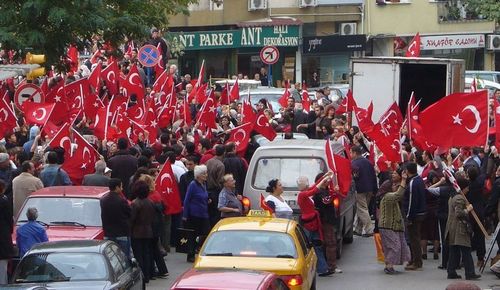
The PKK Intensifies its Terrorist Campaign
Publication: Eurasia Daily Monitor Volume: 6 Issue: 83
By:

On April 27, Police in Istanbul conducted operations on 60 different addresses, targeting the newly emerged militant organization Devrimci Karargah (DK) (Revolutionary Base). The police detained 40 suspects. At one address they exchanged gunfire with a militant for over six-hours. During the operation, the militant -Orhan Yilmazkaya- a police captain, and a civilian were killed and seven other police officers were wounded (Zaman, November 28, 2008). The police later discovered that the DK organization is a leftist revolutionary organization which has an association with the Kurdistan Worker’s Party (PKK). In fact, video footage relating to the killed member of the DK was later released to the media, clearly showing that PKK members were instructing Yilmazkaya in the use of weapons (Milliyet, April 28).
This recent clash with the police was not the DK’s first terrorist attack. In August 2008, the DK organized a failed attempt to attack the 1st Army headquarters in Istanbul (Milliyet, August 13, 2008). On December 1, 2008 the DK targeted the Justice and Development Party (AKP) Istanbul office, during which ten civilians were wounded (www.bianet.org, December 2, 2008).
Turkish intelligence agencies reported that the DK organization was formed by the PKK in order to operate within city centers on their behalf. In these same reports, it was alleged that the PKK has redeployed its Turkish members to operate under the banner of the DK to conceal the PKK’s involvement (Milliyet, April 29). Another interesting development concerning the DK occurred in October 2008, when the merger was announced of the DK with the Revolutionary Left organization -another leftist Turkish militant organization. In that announcement, both organizations declared that "the DK by joining the Revolutionary Left, strengthened its power to intensify its attack on major cities in Turkey. The DK has decided to associate with the PKK which is a necessity for the revolution" (Firat News Agency, October 6, 2008).
In addition to the DK, the PKK has also intensified its attacks on the Turkish armed forces. On April 29, the PKK managed to explode an Improvized Explosive Device (IED) in the countryside in Diyarbakir province, targeting an armored military vehicle and killing nine soldiers (Milliyet, April 29). Another clash between the PKK and the Turkish military, took place in Semdinli in Hakkari province. In that clash PKK militants killed one Turkish soldier. In addition, PKK supporters threw Molotov cocktails in Van and Adana provinces (Hurriyet, April 29).
The recent terrorist attacks took place during the period of a unilateral ceasefire by the PKK which it had declared in early March, before later extending this until June 1 (Milliyet, April 15). On the same day as the clash between the DK militant and the police, the leader of the Democratic Society Party, the political wing of the PKK, gave an interview to the Turkish press in which he argued that the PKK might withdraw its militants from Turkish territory if the authorities adopted a "positive attitude" toward the Kurdish question (Taraf, April 27). At the same time the PKK leader Murat Karayilan declared that if Turkey’s leadership does not approach the PKK’s ceasefire positively, then the PKK may intensify its attacks on the Turkish security forces (ANF News Agency, April 14).
The recent PKK attack happened shortly after the U.S. Chairman of the Joint Staff Admiral Michael Mullen’s visit to Northern Iraq and Ankara on April 25 (Zaman, April 26). Turkish Chief of Staff General Ilker Basbug stated that they had discussed regional developments, including the situation within northern Iraq (Hurriyet, April 29).
It appears that the PKK, under pressure from the international community, and especially with the influence of Kurdish leaders within northern Iraq, declared a unilateral ceasefire in March and extended it until June. However, as the international community’s attention has shifted to other issues such as Afghanistan and Turkish-Armenian rapprochement, the PKK has now resumed its terrorist campaign.
Clearly, the AKP government’s rapprochement policies toward Armenia disappointed the nationalist segments of Turkish society. If the PKK continues its terrorist campaign it will further galvanize Turkish nationalists in their attitudes toward the AKP government. In this case, the AKP government may face a severe test of its policy on the Kurdish issue.




